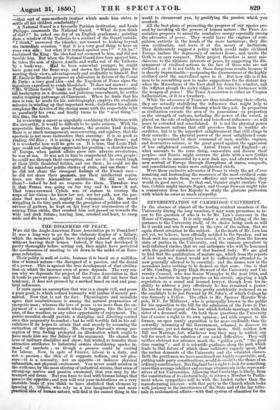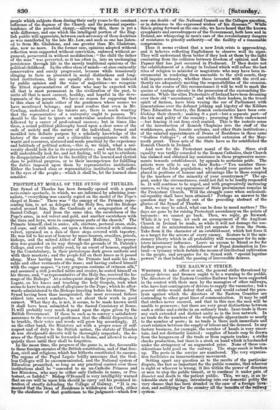REPRESENTATION OF CAMBRIDGE 1TN1YERSITIL Ix the absence of almost all
the leading resident members of the University during the long vacation, it may seem premature to re- cur to the question of who is to be Mr. Law's successor in the House of, Commons. It is only under a strong feeling of the im- portance to the University itself, of its choice being such as will do it credit and win it respect in the eyes of the nation, that we again direct attention to the subject. As the death of Mr. Law has not yet, we believe, been officially notified to the Speaker, and no fresh writ has consequently been issued, it is only from the known state of parties in the University, and the rumour prevalent in well-informed circles, that we can anticipate who will honoured with the political confidence of that learned body. We are glad to find that the qualification of mature age, which from the reports of last week we feared would not be sufficiently attended to, is now generally allowed to be essential; and the names now in the ascendant leave nothing to be desired on that score. One is that of Mr. Cowling, Deputy High Steward of the University and Uni- versity Counsel, who was Senior Wrangler in the year 1824, and is now a barrister in large practice on his circuit, enjoying a high reputation as a sound and learned lawyer, though, from his in- ability to address a jury effectively he has remained a junior: He has for some days past been pretty confidently reckoned on as the candidate to be put forward by St. John's, of which College he was formerly a Fellow. The other is Mr. Spencer Horatio Wal- pole, M.P. for 3fidhurst ; who is principally known to the public for his opposition to the bill for the admission of the Jews to Par- liament, and the repeal of the law which forbids marriage with the sister of a deceased wife. On both these questions the University has of course a right to its own opinion ; and with respect to the former an open manly opposition is far more creditable than the cowardly trimming of the Government, ashamed to disavow its convictions, yet not daring to act upon them. Still, neither Jew Bill nor Marriage Act, whichever way they may be settled, can tell for much in the solution of our social difficulties. They will neither obstruct nor advance much the "golden year," "the good time coming " • and it is scientific guidance along the path which leads to that future of which these volklieder vaguely speak, that the nation demands of the University and the educated classes. Both the gentlemen we have mentioned are highly respectable, and, putting aside party considerations, would do credit to the choice of as ordinary constituency. ButEnglend has a right to look for something morethan average intellect and average attainments lathe represent- atives of her Universities. Allowing that Cambridge is likely, from the oonatitution of its electoral body, to return a Member to Parlia- ment whose sympathies will be with the landed rather than the manufacturing interest—with thatparty in the Church which looks with jealousy to the interference of the fState and of the lay tribu- nals in ecclesiastical affairs—with that system of education for the iieople which subjects them during-their early years to the constant influence of the dogmas of the Church and the personal superin- tendence of the parochial clergy,—allowing this, there iset a wide difference, and one which the intelligent portion of the 'Eng-
lish public will appreciate, between such advocacy of these doctrines as was manifested by the late Mr. Law, and such as one has listen- ed to from Mr. Gladstone, and one greater than Mr. Gladstone, alas, now no more. In the former case, opinions adopted without reflection were supported without conviction, enforced without ar- gument, persevered in without modification " the child the father of the man" was I • rverted, as it too often is, into an unchanging persistence thro life in the merely traditional opinions of the
political childh In the other class of minds—at once eminently
conservative and surely progressist, because while tenaciously
••to facts as presented in social distinctions and long- institutions, they are equally alive to facts as indexed by public opinion and the voice of majorities—we recognize the fittest representatives of those who may be expected with all that is most permanent in the civilization of the past, to unite all that is most earnest, healthy, and hopeful in the deve- lopments of the present. We have no reason for supposing that to this class of minds either of the gentlemen whose names we have mentioned belongs ; and must confess that even in Mr. Cowling, undoubted as his talents are, there is much wanting that the representative of a university ought to. possess. We should be the last to ignore or undervalue academic distinction followed by a career of professional success; but in times like these, a sound political philosophy based upon a clear sense of the ends of society, and the nature of the individual, formed and moulded info definite purpose by a scholarly knowledge of the history of the country and a catizenlike acquaintance with its wants and resources, matured and made practical by the experience and habitude of political action,—this is, we think, what a uni- versity should look for in its representative ; and what the nation will undoubtedly look for, and not finding, will be apt to attribute its disappointment either to the hostility, of the learned and clerical class to political progress, or to their incompetence for fulfilling the duties imposed upon them by representative institutions. Either the learned class or representative institutions will suffer in the eyes of the people;—which it shall be, let the learned (lass consider.



























 Previous page
Previous page